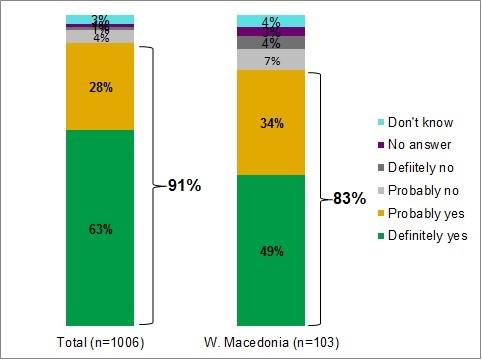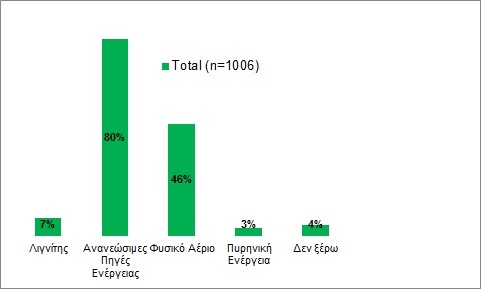Greece: 90% “NO” to Lignite
Monday, 23 November 2015
9 out of 10 citizens believe that the Public Power Corporation (PPC) should shift to clean energy, while only 7% prefer lignite for electricity production, according to a nationwide survey presented today by WWF Greece.

Question: Do you think that PPC should shift to Renewables?
A nationwide poll conducted by QED on behalf of WWF Greece debunks another political myth: the supposed popularity of lignite, the so-called 'national' fossil fuel. The aim of the survey was to measure the degree of awareness on climate change, environmental and electricity production issues, as well as the environmental and socio-economic impacts from the operation of lignite plants.
The survey results are overwhelming. Over 80% of citizens support the shift of the country’s energy model to renewable energy sources (RES). 67% urges for a direct change towards RES, in a period when PPC asks for free CO2 emission allowances in order to perpetuate its lignite-based electricity production model. 22% of the citizens are in favor of the exhaustion of coal deposits before shifting to RES, while only 4% ultimately insist on lignite.

Question: To which of the following sources should the country focus for electricity production?
Of particular interest are the findings for the lignite-plagued region of Western Macedonia, where the current government continues moving forward with the irrational investment of a new, polluting, and economically unsustainable lignite plant, Ptolemaida V. The new lignite plant, agreed in 2009, clearly cannot withstand the recent changes in ETS and the European environmental policy. Despite the unfounded persistence of the government and PPC on the "cheap lignite" argument as well as on the “state-of-the-art” environmental performance of the new plant, 58% of the total respondents and 50% of Western Macedonia residents think that the plans for new lignite plants should be canceled.
"WWF Greece’s public survey, a few days before the beginning of the decisive COP 21 in Paris, clearly demonstrates that Greek society overwhelmingly embraces the abundant scientific findings which urge for independence from fossil fuels and a decisive shift to clean energy" says Nikos Mantzaris, policy officer for energy and climate change. "Greece’s political leadership must seriously take into account the fact that the significance of addressing climate change is now reflected in the public opinion as a clear social demand for change of the current, polluting, lignite-based energy model. Climate change is not a phenomenon of the future that does not concern us. It affects every aspect of human activity and alters the natural evolution of our planet."
Basic findings of the public survey:
1. 63% believe that the country is greatly affected by climate change. To those who feel even a little informed about climate change, the figure rises to 81%.
2. 60% of citizens are in favor of tightening climate policy, even if it means a substantial cost, while for the more informed citizens this figure reaches 78%.
3. Reducing dependence on fossil fuels favors 64% of the total. This percentage is reduced to 55% in the region of Western Macedonia, and is greater in Thessaloniki (71%).
4. 9 out of 10 citizens are convinced of the impact of PPC’s lignite thermal power stations, both on the environment and on the health of residents in the areas of operation.
5. 75% of Western Macedonia residents and 66% of all considers it very important to undertake studies on the effects on residents’ health in the areas where PPC operates its power stations.
6. 6 in 10 say that PPC must bear the costs to public health arising from the operation of its plants.
7. 2/3 of the citizens consider that PPC has to bear the cost of the huge water consumption of its thermal power stations.
8. 58% of the total and 50% of the Western Macedonia residents think that plans for new lignite plants should be canceled.
9. 83% (67% in Western Macedonia) prefer the installation of a wind farm to that of a thermal power station in their region.
10. Over 80% of respondents support the shift of energy policy to renewables while only 7% insist on lignite.
11. 67% of citizens (56% in Western Macedonia) consider that the country's energy policy needs to shift to renewable energy, 22% (21% in Western. Macedonia) to do so after the exhaustion of existing lignite deposits, while 4% (8% in Western Macedonia) considers the use of lignite as the best choice.
12. The immediate shift to renewable energy considers as the right move for the country, 73% of the total. In Western Macedonia this figure is somewhat lower (65%).
13. 9 in 10 (8 out of 10 in Western Macedonia) consider that PPC should follow the example of other energy producing companies and focus on Renewable Energy Sources.
14. The perception of the need to create a national energy savings policy is widespread. The creation of jobs and the reduction of energy consumption are considered as the most important benefits.
15. Agriculture is considered as the most important sector for boosting employment in Western Macedonia.
16. The government is considered to be responsible for the development and implementation of a transition plan towards a post-lignite era (53%). The respective costs should be covered primarily from the state budget (40%), followed by the PPC and the European Union.
Share this



